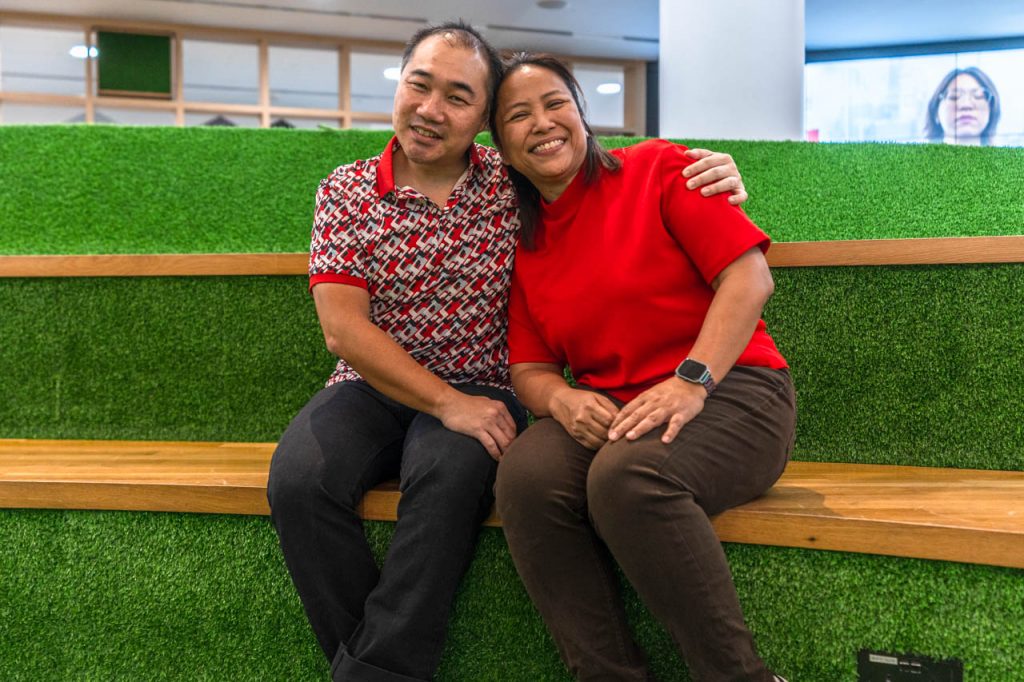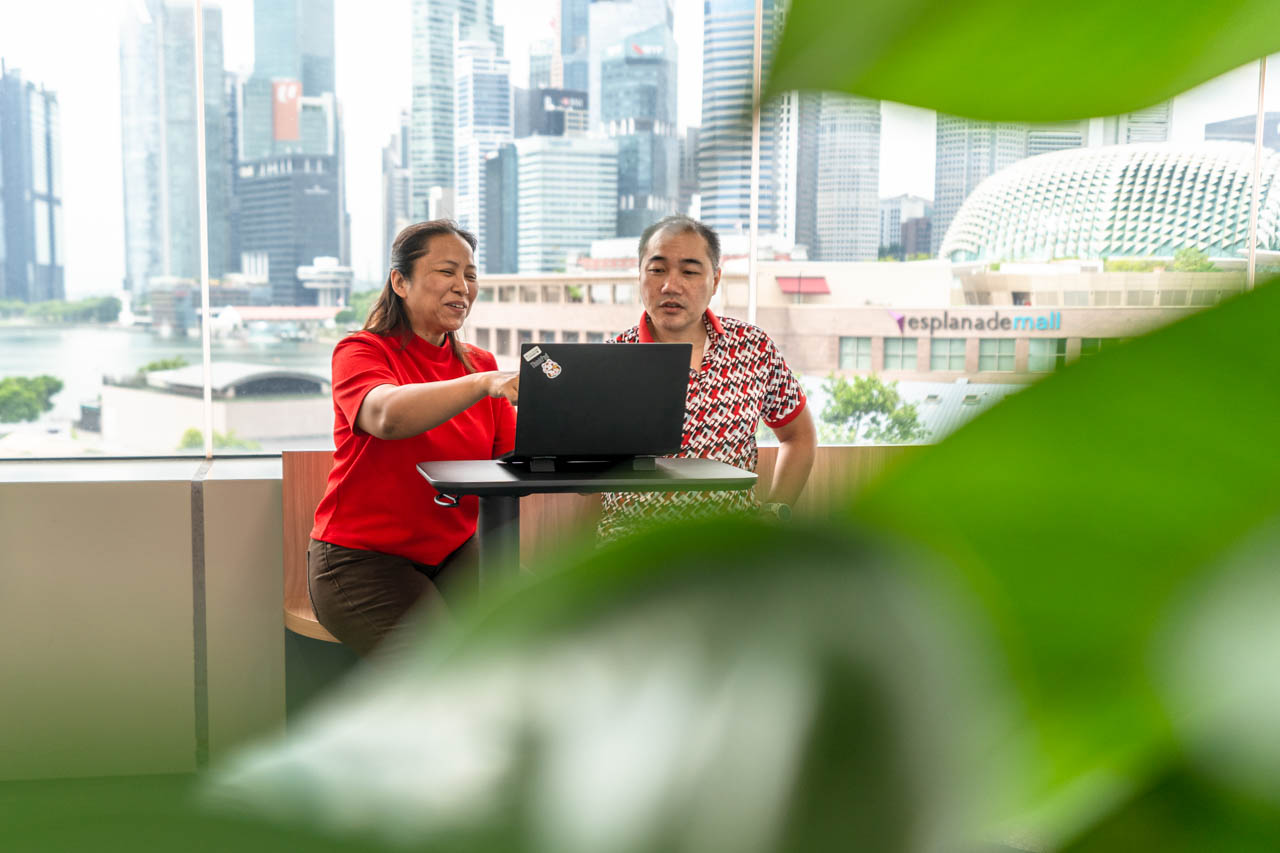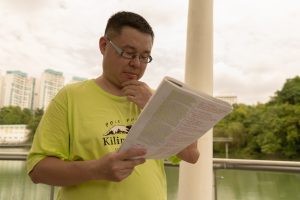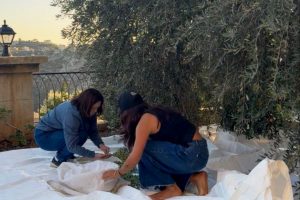All images by Nicholas Chang for RICE Media.
On a Saturday night at 7:30 PM, Lina Ali and Dex Tan are simply chilling at home. The couple are on a Google Meets call with me in their living room. They have yet to have their dinner— I assure them the call will not take too long.
Dinnertime can be sacred for couples, but Lina and Dex are indifferent to it tonight—not out of disinterest, but because they’re fully immersed in sharing insights about life as a DINK (double income, no kids) couple in their 40s.
At first, they were both engineering students at Nanyang Polytechnic, just a few batches apart. They would meet again years later as wushu practitioners through a mutual friend. Soon after, marriage.
While they studied in the same polytechnic course, their careers went in vastly different directions. Lina went into construction. Dex went into MINDEF.
And now, they’re back to where they started: as students.
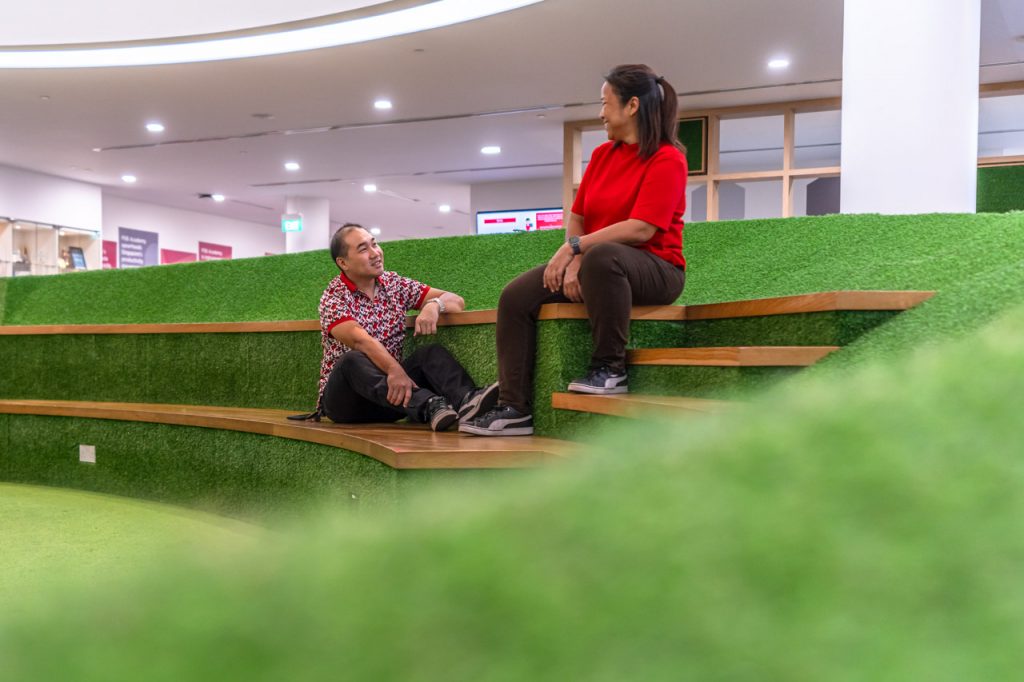
High on Higher Learning
Lina and Dex are among the many Singaporean adults returning to education after years (sometimes decades) in the professional wilderness. For them, the adult learning experience has brought clarity to the disparate skills they’ve acquired throughout their careers.
Adult learning this year has also seen a boost in the public eye. In February, Prime Minister Lawrence Wong announced new measures to enhance the SkillsFuture initiative, while NUS announced fee rebates of up to 40 percent for adult students under their Master’s programmes.
At PSB Academy, Coventry University (CU) course lecturers Dr Melissa Liow and Dr Lim Chong Lye, pursued higher education while in the hospitality and semiconductor engineering industries, respectively, having gone through several jobs and seen how these industries have survived (or floundered).
So it’s no surprise that they embrace spending time with students—both young and old—to discuss navigating the industries they want to enter.
“Many students may think that their first fit [in hospitality] is to enter the hotel industry,” says Dr Liow.
“But I let them know that there are a lot of other choices that they can go to, like cruise liners, airlines, theme parks. For my students I do observe their personality—we run a little bit of a psychometric test with them to know what type of line of work their personality might support.”
Even students in their first term, Dr Liow adds, are already able to plan their future careers thanks to the support and professional guidance of their lecturers.
“I do believe that we don’t just teach students academic or technical skills, we also provide them a chance to enhance their soft skills,” says Dr Lim. He adds that Coventry University students at PSB Academy are given the opportunity to network with industry professionals through student-run events.
“Degree courses are meant to arm students with the necessary knowledge, skills and faculties to prepare for the corporate world,” says Dr Liow.
Lina and Dex are no strangers to the corporate jungle, but they certainly appreciate the additional navigation. Throughout our conversation, their lived experiences echo the sentiments of many adult learners navigating this strange, transformative phase.
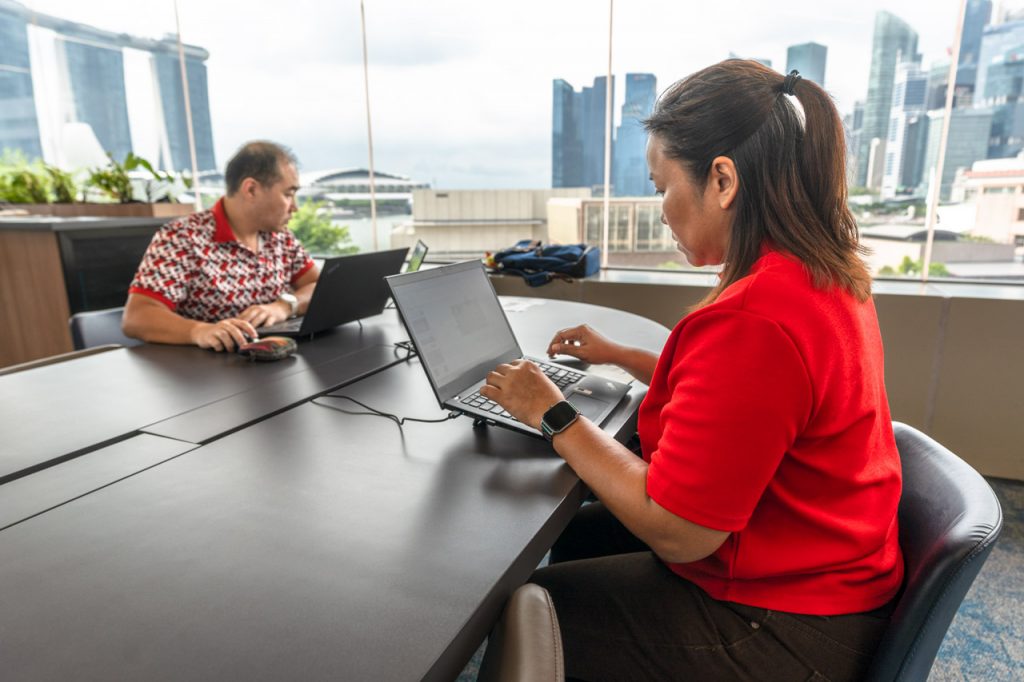
Pause To Continue
So both of you were in the same engineering course at Nanyang Polytechnic.
Lina: He was stalking me (laughs).
What do you remember about Dex back then, Lina?
Lina: We basically met outside. I had no idea that he was from the same school.
Dex: She specialised in automation. I was in product design.
Lina: We only got to know about each other – and where we came from – when we were in the same wushu class in our RC (residential committee) years later.
When was this?
Dex: Around 1997 to 1998. We got married in 2001.
Lina, what was it like graduating as a poly student as you headed into building your career?
Lina: I came from the second batch of Nanyang Poly’s mechatronics engineering course. So, when we graduated, many jobs in automation were mostly in Japan and all that. I didn’t really get to follow up with my qualifications. Many in my cohort moved on to either starting their own businesses or jobs unrelated to engineering.
Luckily for me, I got to follow through with the engineering side of things. As I progressed on—from manufacturing to construction, project management to consulting—things have just kind of gelled together. It’s been, like, bits and pieces, here and there.
Recently, I’ve been looking for something that could make sense of all these things that I’ve picked up over the years. I first heard of PSB Academy through my brother-in-law, who graduated with a degree from Coventry University. I learned one of their courses fit exactly what I was looking for, covering the aspects of everything I’ve learned throughout my various careers.
Then, surprisingly, Dex also joined up! Not the same course, but under the same university.
Dex: (wistful) The environment over there was pretty nice…We talked about enrolling, but it wasn’t until we came back to Singapore that we made our decision. Lina settled on a Master’s degree in Engineering Management; I’ve taken up an MBA in Global Business Management.
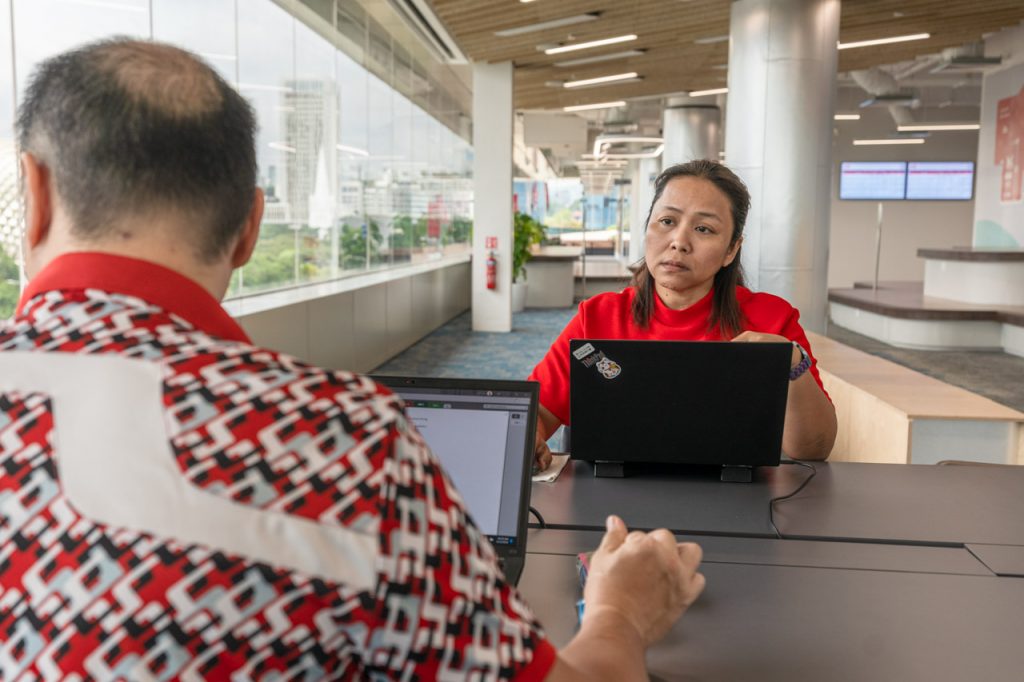
What is it like as a married couple enrolling at the same time?
Lina: Actually, we did have a discussion about it. I was sceptical about us doing the same masters. It’s just the two of us. But we’re already in our 40s, so why not?
Dex: I learned from COVID that there’s never really the ‘best time’ to do something.
Lina: What helped was that we got support in doing this from our colleagues and bosses. Financially, we can handle it. Time-wise, we can manage that too.
You mentioned that it’s just the both of you. Have children ever been factored into planning for your future?
Lina: Yeah, we don’t have children (giggles).
Dex: I think… we’ve enjoyed the freedom.
Lina: If we were to have children, there would be a lot of planning involved. Planning around our work, his business trips.
How about wushu? That’s something that has drawn you both together.
Dex: That has pretty much become our exercise routine now. When we have the time after class, we can have a short session.
Lina: Previously, we were much more involved, and we used to go for competitions. But that has been sidetracked for our masters.
Dex: We are in different industries, but we have overlaps where we can help each other. Now, coming back home, we aren’t just sharing about our day—we get to talk about what we learned that may also benefit the other.
Lina: I think it’s how we see life, the way we see studying and work, stuff like that. We have our arguments, though. (laughs)
Such as?
Dex: Just a couple of days ago, I was rushing an assignment that was due at midnight. I wanted to ask her for help, but she was rushing hers too. I can be quick-tempered, so it would become pretty noisy at home (laughs)
Rewinding Forward
So has it been tough going back to studies at this life stage?
Lina: Definitely, since we’re making the jump from diploma to masters. Stuff like research papers, reading journals—it has been one big culture shock for us.
Dex: Put it this way. Even if we had taken our degrees years ago, the environment would still be different from what we face today. There has been a huge change, from what I learned from my colleagues.
Lina: The one thing that has been good is that our work experience allows us to relate to what we’re being taught in class. It’s reaffirming what we already know or assume, but putting it into perspective. The difficult part is, really, putting it together as coursework.
Dex: Yeah, it’s not about what they teach. It’s how they facilitate these ideas and experiences we’ve had, allowing us to understand it all better.
You’re also studying alongside coursemates who are much younger. Do they come up to you to ask about your work experiences?
Lina: Yes, definitely! They’ve also introduced us to new ways of doing things. Like ChatGPT (laughs)
Dex: I’ve learned from my coursemates things like writing a proper academic paper.
Lina: For something like AI, at first, I was apprehensive. I thought it was no good because you’re not putting in the effort. But working with these younger students who have experience with it and learning from our lecturers about the ethical ways of using it, I’ve come around. I’m trying to explore ways of utilising it to help me with my work.
Has anything changed the way you see things in your work?
Lina: There’s definitely a conflict between what you’ve learned and how you can apply it. But, that one, it depends on who is leading lah.
Dex: I’ve come across people in the project management industry who haven’t kept up with the technology, so the tools they use are limited. For myself, undertaking this course has meant being able to keep up with all of that.
Lina: I would say we’re part of a “teething generation”; we are split between the past and the future. So it’s a good thing that we embrace what will come, and we don’t, you know, hold on to the past of the way things used to be.
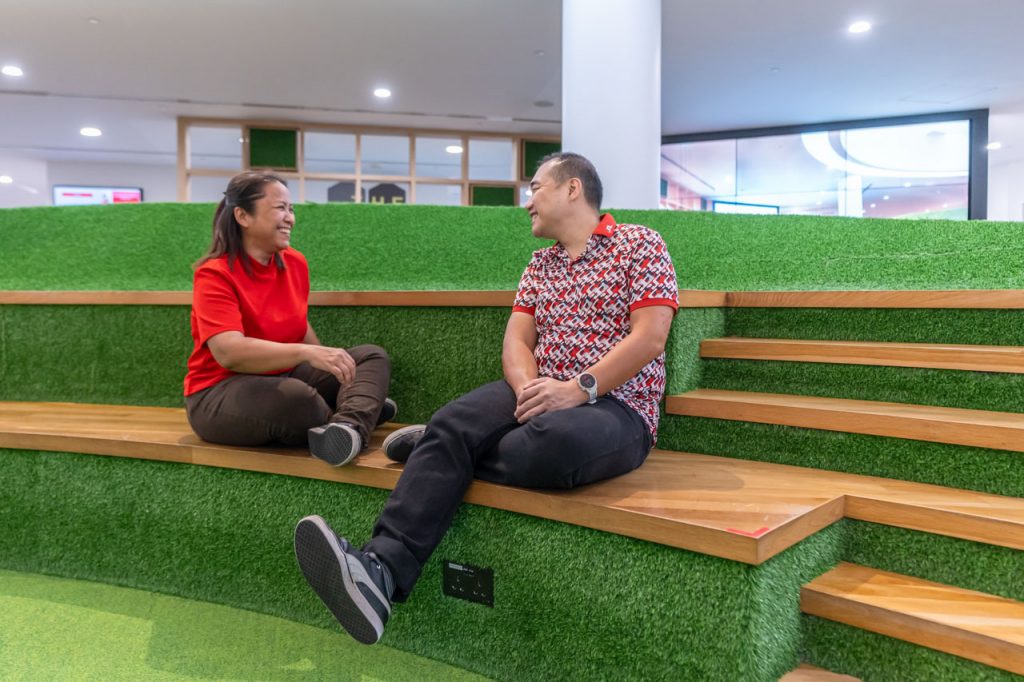
Elder Masters
Have your colleagues considered taking up courses like you two?
Lina: Those who are of the same age as us prefer not to. Everybody’s telling us that we are crazy to study at this age. But we keep reminding ourselves: hey, there are people in their 50s going for their masters, too.
Dex: I think learning is a way of continuing to improve. We can be very easily held up by whatever we’re currently doing, but it may not work that way in the future.
You’re taking part-time courses. How is that like juggling with work?
Lina: Honestly, we’re trying to stay awake during night classes.
What’s keeping you both going?
Lina: Well, paying for the course is one (laughs). You have to remind yourself what you have gotten into, and why you did it.
Dex: It’s not easy. We spend almost all of our time on the weekend reading notes or working on assignments. If not that, then it’s group projects. We don’t really have the time to take a breather.
Lina: But we remind ourselves that this is just for one-and-a-half years, to just bite the bullet.
Dex: In our classes, there’s a lot of interaction and discussion involved. The lessons are never boring.
Lina: Yeah, even if we felt like it, there’s no way to sleep in class (giggles).
